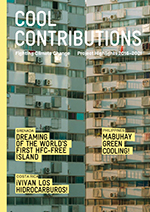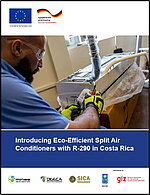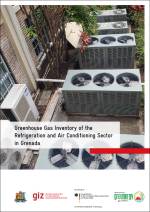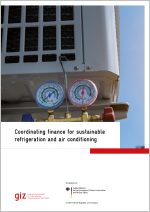Cool Contributions fighting Climate Change (C4)
According to projections, the global consumption of climate-damaging F gases for refrigeration and air conditioning will have quadrupled by 2030. The project supported the comprehensive international control of F gases. To this end, it bundled, harmonised and strengthened relevant international initiatives. The project’s strategic approach involved supporting six key partner countries in formulating their individual climate change mitigation contributions, introducing transformation policies, supporting the further development and implementation of NDCs and removing barriers to the use of natural refrigerants & propellants. Thanks to institutionalised structures and networks, the project achieved a multiplier effect in the six UN regions.
- Countries
- Costa Rica, Cuba, Grenada, Iran, Philippines, Viet Nam
- IKI funding
- 4,700,000.00 €
- Duration
- 01/2016 till 10/2021
- Status
- completed
- Implementing organisation
- Deutsche Gesellschaft für Internationale Zusammenarbeit (GIZ) GmbH
- Political Partner
-
- Climate Change Commission (CCC) - Philippines
- Department of Environment - Islamic Republic of Iran
- Ministry of Environment and Energy (MINAE) - Costa Rica
- Ministry of Finance, Planning, Economic Development, Trade, Energy and Cooperatives - Grenada
- Ministry of Natural Resources and Environment (MoNRE) - Viet Nam
- Ministry of Science, Technology and the Environment (CITMA) - Cuba
State of implementation/results
- Project completed.
- Technical working groups with participation of key actors (National Ozone Unit, Climate, Energy Efficiency) established
- Tools for inventory-taking and sectoral analysis developed
- RAC sector analyses and GHG inventories are being prepared in all partner countries, and a refrigeration sector-specific NDC strategy is already being developed
- In Iran, the GHG inventory for the refrigeration sector has been completed.
- Guidance for policymakers in RAC & F sector published and presented during COP22 in Marrakech: “Advancing nationally determined contributions (NDCs) through climate-friendly refrigeration and air-conditioning: Guidance for policymakers” (also available in Spanish).
- Participation of the partners in COOL training to strengthen the capacity for a comprehensive development of GHG mitigation strategies in the RAC & F sector
- During the OEWG 39 in Bangkok, global workshop "Promoting Green Cooling and Sustainable Sector Transformation" with project partners for energy efficiency, F-gases and climate change conducted in July 2017
- A first kick-off and strategy workshop was held with the project partners Ministry of Innovation, Technology and Environment (CITMA) and the Center for Information Management and Energy Development (CUBAENERGIA) in Cuba in March 2018
- For five of the six partner countries, an analysis on costs, energy consumption and climate impacts of split air conditioning systems was prepared and discussed with experts and country representatives.
- The study "Non-state action towards climate friendly and energy efficient refrigeration and air conditioning" was published and presented in a joint webinar with the North American Sustainable Refrigerant Council, the Climate and Clean Air Coalition, and the Climate Collaborative.
- In August 2018, the concept paper on "Coordinating Finance for sustainable refrigeration and air conditioning" which was developed jointly with BMU was published.
- In the Philippines, 10 climate-friendly and energy-efficient split air-conditioning systems (AC) were imported and operated for demonstration purposes in various facilities such as training centres and ministries.
- AC refrigeration technicians were trained in handling the systems by a refrigeration trainer.
- In Grenada, 30 climate-friendly and energy-efficient split air-conditioning systems (AC) were imported via the project and installed for demonstration purposes in various facilities such as hotels or public buildings; the measurements showed that the systems are up to 70% more energy efficient compared to the old systems. The measure was documented by Deutsche Welle and published in a short film in September 2018.
- The GHG inventory for Costa Rica’s cooling sector was completed in accordance with the partners and published on the IKI website.
- The GHG inventory for Grenada’s cooling sector was completed in October 2019, the report will be published soon on the IKI website.
- Following the Montreal Protocol OEWG 39 in Bangkok, a global workshop was ornagized in July 2017. Ministerial representatives from the above mentioned countries shared their experience and plans. The core elements for an MRV system fort he cooling/climate sector were elaborated.
- During a virtual conference on 20 November 2019, the draft plan for an MRV system in the cooling and climate sector and the product registration system developed by U4E were presented and discussed with U4E and industrial representatives.
- In September 2019, the R290 Split Air Conditioner Resource Guide which was developed in cooperation with the German Environment Agency (UBA) was published via various media (e.g. IKI project website).
- Based on the Resource Guide for the market integration of R290 split air conditioners developed with UBA, a webinar was held together with UBA, shecco, a global market accelerator for climate friendly technologies, and the Belgian food store chain Colruyt. Challenges and potentials of the global market launch of efficient R290 split air conditioners were presented and discussed.
Latest Update:
12/2024
Project relations
Legend:
The link has been copied to the clipboard
Related Publications
-
 08/ 2021 | Guideline
08/ 2021 | GuidelineMeasurement, Reporting and Verification (MRV) in practice
English (external link)
-

-

-


























